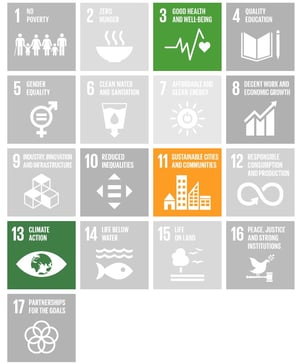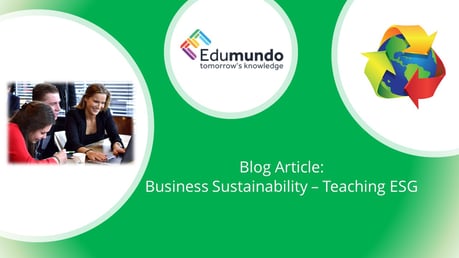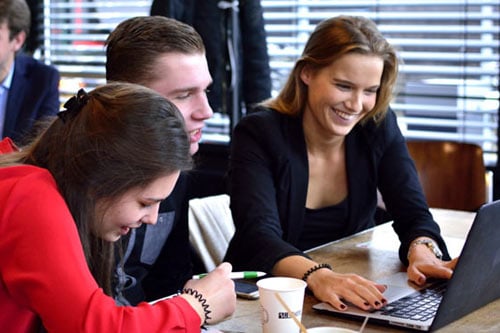In the Sustainable Business Simulation teams of students become the management function of their own multi-national company (MNC). Here they are tasked with improving company performance in terms of generating profit but have to balance this with initiatives aligned to 3 or 4 of the 17 Sustainable Development Goals (SDGs). Teams are awarded points weighted on the success of these initiatives as well as their ability to generate profitable business.
The initial task that students teams need to undertake is an internal and external analysis of their company and wider market environment and decide which of the 17 SDGs in which to align their business strategy. Students can choose to invest and implement a range of SDG-aligned practices including:

A key skill that all of our simulations help foster is team-working. Students need to work together within their team to delegate roles and responsibilities among them, determining who will be the CEO, CFO, HR Manager, Marketing Manager, Sustainability Manager, and Head of Operations.
Student teams determine their own organisational structure and once the team is in place they must work together during each round to determine which actions to take and in which functions, making sure to respond to news items that could impact their company's performance and sustainability initiatives.
The Sustainable Business Simulation is typically assessed in several ways. Below you will find the most popular options:
"I think more and more universities are beginning to understand that students want to be equipped with knowledge linked with sustainability. It's not just the job of an environmental and sustainability department. It also shouldn't be featured in every single module, but be prevalent in extra-curricular activities instead of just formal curricula.”

In this blog article we hear from two leading academics on the topic of business sustainability. The changes they've seen to the curriculum, the new, innovative ways to teach students about the topic, and how business has to adapt to integrating viable sustainability initiatives. 
| Overview | |
|---|---|
| Student Levels: | Undergraduate & Postgraduate |
| Module subjects: | International Business & Management, CSR, Business Ethics, Business Sustainability |
| Languages: | English and Dutch |
In a business simulation theoretical models are put into practice. They provide participants with a unique experience in which team-working, analytical thinking and insight, and decision-making skills are trained and tested throughout each round, enabling student-led and experiential learning.
.png?length=300&name=unnamed%20(11).png)
.png?length=300&name=unnamed%20(7).png)
.png?length=300&name=unnamed%20(8).png)
.png?length=300&name=unnamed%20(6).png)

.png?length=300&name=unnamed%20(10).png)
.png?length=300&name=unnamed%20(5).png)
.png?length=300&name=unnamed%20(9).png)
.png?length=300&name=unnamed%20(4).png)
.png?length=300&name=unnamed%20(2).png)
.png?length=300&name=unnamed%20(1).png)
.png?length=300&name=unnamed%20(3).png)
.jpg?length=300&name=unnamed%20(2).jpg)





.png?length=300&name=loughborough-university-logo%20(small).png)


 Management simulation
Management simulation Edubook
Edubook
application recieved
We have received your question and we will return to you within 24 hours on workdays.